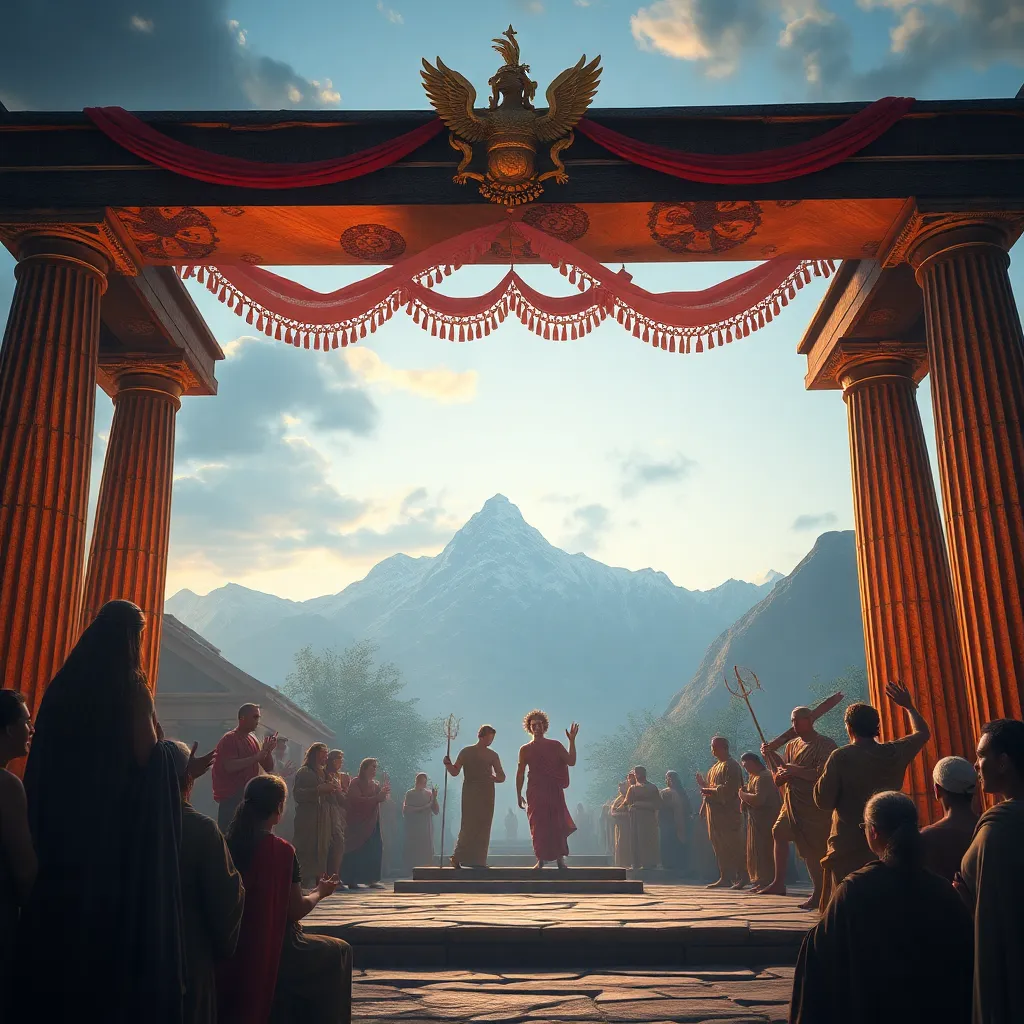The Festivals of Mount Olympus: Celebrations of the Gods
I. Introduction
Mount Olympus, the mythical abode of the Greek gods, stands as a symbol of divine power and influence in ancient Greek culture. Nestled in the northern part of Greece, it was not only a physical location but also a realm of myth and spirituality, where gods like Zeus, Hera, and Athena reigned supreme. Festivals held in honor of these deities played a pivotal role in the social and religious life of the Greeks, serving as occasions for community gatherings, religious observance, and cultural expression.
This article aims to explore the key festivals dedicated to the gods of Mount Olympus, shedding light on their significance, rituals, and lasting impact on ancient Greek society and beyond.
II. The Significance of Festivals in Ancient Greece
Festivals in ancient Greece were more than mere celebrations; they were vital events that fostered community spirit and reinforced cultural identity. Their significance can be outlined as follows:
- Role of Festivals in Uniting Communities: Festivals brought together citizens from various regions, enhancing social bonds and communal harmony.
- Religious Significance: These events were rich in religious connotation, involving offerings and sacrifices to the gods to seek their favor and blessings.
- Connection to Agricultural Cycles: Many festivals were timed with agricultural seasons, celebrating planting and harvest, which were crucial for survival and prosperity.
III. The Olympic Games: A Celebration for Zeus
The Olympic Games, perhaps the most famous of all ancient Greek festivals, were held every four years at Olympia in honor of Zeus. The historical background of these games is as follows:
- Origins: The first recorded Olympic Games took place in 776 BC, although they likely existed in some form long before that.
- Events: Athletes competed in various events, including running, wrestling, boxing, and the pentathlon, showcasing physical prowess and dedication to the gods.
- Cultural Impact: The games fostered a sense of unity among the Greek city-states, encouraging peace and cooperation during the festival period.
The legacy of the Olympic Games continues to resonate today, influencing modern sports and international competitions.
IV. The Dionysia: Revelry and Theater in Honor of Dionysus
The Dionysia was a festival that celebrated Dionysus, the god of wine, fertility, and theater. This vibrant festival included:
- Celebration of Wine: The festival featured drinking, revelry, and the liberal consumption of wine, symbolizing the joy of life and the bounty of nature.
- Theatrical Performances: The festival is credited with the birth of Greek drama, where playwrights like Aeschylus, Sophocles, and Euripides showcased their works.
- Fertility Rites: Rituals associated with fertility were performed, linking the agricultural cycle with the life-giving force of Dionysus.
The impact of the Dionysia on drama and the arts is immeasurable, laying the groundwork for Western theater as we know it today.
V. The Panathenaia: A Grand Festival for Athena
The Panathenaic Festival, held in Athens, honored Athena, the city’s patron goddess. This grand festival featured:
- Athletic Competitions: Events such as foot races, wrestling, and chariot races were held, attracting competitors from across Greece.
- Cultural Displays: The festival included artistic and cultural presentations, showcasing the talents of Athenian citizens.
- Religious Rites: Central to the festival was a procession to the Acropolis, where a new peplos (robe) was presented to the statue of Athena.
The Panathenaia not only reinforced the religious significance of Athena but also highlighted the cultural supremacy of Athens in ancient Greece.
VI. The Thesmophoria: A Festival for Demeter and Persephone
The Thesmophoria was a festival dedicated to Demeter and her daughter Persephone, celebrating agriculture and fertility. Key aspects of the celebration included:
- Women’s Roles: The festival was primarily attended by women, signifying their important role in agriculture and family life.
- Rituals of Fertility: Participants engaged in various rituals to ensure fertility for the crops and the land.
- Customs and Offerings: Offerings of crops and other goods were made to the deities, reflecting gratitude and seeking blessings for future harvests.
This festival underscored the connection between women, agriculture, and the divine, highlighting the essential role of Demeter and Persephone in the agricultural cycle.
VII. The Nemean and Pythian Games: Regional Celebrations of Apollo
The Nemean Games and the Pythian Games were regional festivals that celebrated athletic prowess in honor of the god Apollo. Their characteristics include:
- Nemean Games: Held in Nemea, these games included foot races, wrestling, and various contests, with the victors receiving a crown of wild celery.
- Pythian Games: Established in Delphi, these games included athletic competitions and artistic contests, all held in honor of Apollo, particularly to commemorate his victory over the Python serpent.
- Comparison: Both games promoted regional pride and unity, yet each retained its unique features that reflected the local culture and devotion to Apollo.
VIII. Conclusion
The festivals held in honor of the gods of Mount Olympus were deeply woven into the fabric of ancient Greek society. They served as vital expressions of devotion, cultural identity, and community solidarity. The legacy of these celebrations continues to influence modern culture, from the Olympic Games to theatrical performances that echo the spirit of the Dionysia.
As we reflect on these enduring traditions, we recognize the lasting influence of the festivals of Mount Olympus, reminding us of the rich tapestry of mythology and the divine that shaped ancient Greek civilization.
https://www.youtube.com/watch?v=7x7MNbdeyJI




